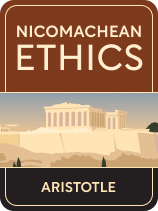

This article is an excerpt from the Shortform book guide to "Nicomachean Ethics" by Aristotle. Shortform has the world's best summaries and analyses of books you should be reading.
Like this article? Sign up for a free trial here .
What’s “the good life”? How is moral virtue achieved? What’s the greatest virtue of all?
These are some of the questions that ancient Greek philosopher Aristotle discusses in the Nicomachean Ethics book. He argues that the best and happiest life consists of the rational pursuit of virtue. He explains the different kinds of virtues, how to become virtuous, and the greatest virtue of all: wisdom.
Keep reading to learn more about this classic work.
The Nicomachean Ethics
In the Nicomachean Ethics book, Aristotle attempts to determine the best possible way a person can live their life. He’s not trying to explain the best way to deal with any given situation—there are far too many possible factors in life for that to be practical. Instead, Aristotle aims to provide a general overview of what an ideal life is and how people can achieve it. We break down his arguments into the following sections:
- Part 1: Defining a Good Life explains Aristotle’s claim that the main goal of life is happiness and outlines his definition of happiness.
- Part 2: Becoming Morally Virtuous describes what it means to be morally virtuous and how someone can develop moral virtue.
- Part 3: Becoming Intellectually Virtuous explores Aristotle’s argument that wisdom is the greatest virtue of all and how wisdom contributes to the possibility of a happy life.
Part 1: Defining a Good Life
Happiness, says Aristotle, is the goal of life. He arrives at this conclusion by examining the nature of human action. Aristotle claims that the purpose of all human actions is achieving some kind of good—that is, we do things because we think they are the “right” or “best” thing to do in a given circumstance. However, these “goods” exist in a hierarchy: If the reason we do action A is so that we can then do action B, it follows that action B is better than action A—action A is just a means to an end.
Aristotle concedes that many people agree that happiness is the goal of human life—the real challenge is defining happiness. He defines happiness as rational activity aligned with virtue.
Aristotle claims that, to judge how good something is, you need to know its “defining activity”: what it (and only it) does. Humans (and only humans) can think logically. This makes reasoning our defining activity, and, therefore, the standard we can use to judge how good a human is. A good human is good at reasoning. A good human, by definition, lives a good life—and a good life is a happy life. Therefore, reason is necessary for happiness.
Since “reasoning” means making choices, “reason aligned with virtue” means making the right choices. If we make the right choices in life, it means we’re good at reasoning—and are therefore happy.
Reasoning aligned with virtue still isn’t enough for happiness—a person also must consistently act on this reasoning. Goodness, explains Aristotle, can’t exist separate from objects or actions—it makes no sense to call a carpenter good if he’s never built anything, for example. Therefore, action is necessary for a good life. However, one or a few actions isn’t enough. Aristotle claims happiness requires consistently good actions over an entire lifetime.
Part 2: Becoming Morally Virtuous
Aristotle claims people are morally virtuous when they habitually do virtuous actions for virtuous reasons. Both of these components are essential to virtue.
Moral virtue is the result of habitual virtuous action. People aren’t born naturally virtuous, so it’s something they have to learn—and people learn through repeated action. Aristotle argues that there aren’t simple, universal rules someone can follow to be virtuous. Instead, a virtuous person must determine what is appropriate for each individual situation and then do it.
For a person to be virtuous, they have to do virtuous actions for the right reasons. People learn to be virtuous through habit—and they won’t learn or create habits from accidentally or unintentionally doing virtuous things. Therefore, virtuous acts are intentional, voluntary, and done for virtue itself rather than some other benefit.
To Aristotle, becoming morally virtuous involves three main components:
- Maintaining a mean between two vices
- Experiencing pleasure and pain
- Receiving moral education
Virtue as a Mean Between Two Vices
People become virtuous by developing specific virtues through habitual action—a person becomes courageous by doing courageous things, for example. However, Aristotle suggests that these virtues can only exist as a happy medium, or “mean.” An overdeveloped or underdeveloped quality isn’t virtuous at all, but rather a vice. For example, someone who has overdeveloped courage is reckless, while someone with underdeveloped courage is cowardly. Therefore, becoming virtuous requires proper development of individual virtues, practicing them in the right amount so they aren’t overdeveloped or underdeveloped.
Pleasure and Pain
Becoming virtuous also involves “training” a person to develop a clear sense of what’s emotionally pleasant or painful—what they like and dislike. This is because moral virtues deal exclusively with matters of pleasure and pain.
To become morally virtuous, a person must learn to take pleasure in virtuous things and to feel pain at vice or wrongdoing. A morally virtuous person doesn’t do virtuous things because of unemotional deliberation—they do virtuous things because it feels good and because they hate what’s immoral.
Moral Education
Aristotle suggests that, to develop the necessary habits and “training” for virtue, a person needs education from a virtuous teacher starting from childhood. A teacher will also recognize the proper “mean” unique to their student: For example, a brave but impulsive student needs to spend more time on moderate actions than courageous actions.
Part 3: Becoming Intellectually Virtuous
After discussing what moral virtues are and how to achieve them, Aristotle then turns his attention to intellectual virtues: different types of human knowledge. He eventually concludes that the best of all virtues (and therefore virtue most important for a happy human life) is the intellectual virtue of wisdom.
Part 3 explains Aristotle’s views on wisdom and happiness by exploring the following:
- Why wisdom is the best intellectual virtue
- Why wisdom is better than moral virtue
- The happiest human life
Claim #1: Wisdom Is the Best Intellectual Virtue
Wisdom consists of philosophical knowledge—which Aristotle claims is the best kind of knowledge. This is because philosophical knowledge is the most universal and stable type of knowledge—the best way to make a table or persuade a friend will change depending on all kinds of circumstances, but a math problem always has the same answer.
In addition, philosophical knowledge is the highest form of knowledge in the hierarchy of goods. People pursue philosophy just for the sake of virtue (the virtue of wisdom, specifically) and the happiness it brings. This means other intellectual virtues are simply a means to an end—and are therefore lesser goods.
Claim #2: Wisdom Is Better Than Moral Virtue
Aristotle claims wisdom is superior because it’s self-sufficient and divine. Morally virtuous actions require situations, things, or other people—and contemplative activities require none of this. A person can contemplate whenever they want to without needing anything else. Further, Aristotle suggests that philosophical inquiry is a divine activity: It’s the activity of the gods and is therefore superior to all strictly human activities. Aristotle says the gods are virtuous by their very nature, as they are perfect. But, as we’ve discussed, virtue requires action—so Aristotle must determine what actions make the gods virtuous.
Defining the Happiest Human Life
After Aristotle defines the perfectly happy lives of the gods (lives that consist entirely of contemplation), he explains how this definition informs happy human lives.
An ideal happy life consists only of contemplation—however, that’s not realistic for any human life. Instead, Aristotle suggests that the human capacity to philosophize (and therefore be happy) exists somewhere between animals and gods. The happiest possible human is morally virtuous in their interactions, meets their physical needs, and spends as much time as they can on philosophical inquiry.
The limitations of a happy life also mean that a person must have certain life circumstances to be capable of happiness. In particular, Aristotle notes two requirements of a happy life:
1) Prosperity: To be happy, a person needs some level of prosperity and wealth—enough that they have leisure time for philosophical inquiry and can easily meet their physical needs. This also means a life defined by great tragedy or misfortune cannot be happy.
2) Longevity: A happy life is a long life. A happy life is a good life, and, for a person to be as good as possible, they need to consistently do good things over the course of an entire human lifespan. Therefore, Aristotle suggests that people who die young can’t achieve happiness—they have less time to live and therefore will do fewer good acts. This doesn’t mean people who die young necessarily live bad or miserable lives, but it does mean that they weren’t able to achieve the best possible (and therefore happiest possible) human life.
Exercise: Consider Your Virtues
Reflect on your virtuous qualities and actions and how they align with Aristotle’s ethics.
- Describe a situation where you felt like you did the morally right thing. (For example, Frank threw a rope down a well to save a child trapped at the bottom.)
- Did you feel “happiness” or a deep sense of satisfaction when you did the right thing in that situation? Do you still feel satisfied about it? Explain your answer.
- Consider some of the worse alternatives you could have chosen in that situation. Do those alternatives have “too much” or “too little” of an otherwise virtuous quality? (For example, Frank could have had “too much” courage and jumped down into the well, trapping himself.)
- Do you feel satisfied when you study philosophical works like the Nicomachean Ethics? Do you feel like reading philosophy makes you a better person? Explain your answer.

———End of Preview———
Like what you just read? Read the rest of the world's best book summary and analysis of Aristotle's "Nicomachean Ethics" at Shortform .
Here's what you'll find in our full Nicomachean Ethics summary :
- Aristotle's philosophies on topics such as happiness, virtue, and wisdom
- What it means to be morally virtuous and how someone can develop moral virtue
- How wisdom contributes to the possibility of a happy life






